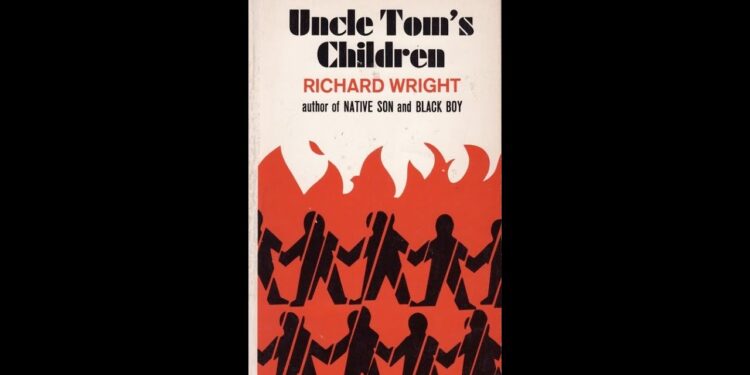Table of Contents
ToggleIntroduction
Big Boy Leaves Home Summary By Richard Wright Richard Wright, one of the most influential American writers of the 20th century, is renowned for his stark portrayal of racial tensions, oppression, and the human struggle for dignity. His works, particularly Native Son and Black Boy, have left an indelible mark on American literature.
In his short story Big Boy Leaves Home, Wright explores themes of racism, social injustice, and personal identity, weaving a narrative that speaks to the psychological and emotional challenges faced by African Americans in a deeply segregated and prejudiced society.
Published as part of Wright’s Uncle Tom’s Children collection, Big Boy Leaves Home tells the story of a young African American boy named Big Boy, who embarks on a journey of self-discovery, fleeing from the confines of his childhood home.
The narrative explores his interactions with a racially oppressive society and the brutal realities of growing up black in the South during the early 20th century. With its clear emphasis on racial violence, social expectations, and personal growth, the story is a compelling look at how young African Americans navigated the complexities of an unjust and segregated world.
Summary of Big Boy Leaves Home by Richard Wright
Big Boy Leaves Home begins with a young African American boy named Big Boy, who is growing up in the deep South, a place marked by the systemic racial discrimination of the early 20th century. Big Boy is a well-built and strong young man, an emerging figure in his community who has begun to gain a sense of his own identity and independence. However, he is still constrained by the rigid social structures that define his world—his family, his community, and his position as a black youth in a society dominated by white supremacy.
The story opens with Big Boy and his friends at the train station, eager to leave their small, impoverished town in search of something better. This decision represents Big Boy’s coming-of-age moment, a recognition that his world is too limited, too oppressive, and too dangerous for him to stay any longer. At the same time, it also signals his growing awareness of his own vulnerability as a young black man in a white-dominated society.
Big Boy’s decision to leave home is rooted in the experiences he has had with racial violence and the oppressive realities of life in the South. Throughout the story, he is keenly aware of how African Americans are treated, and he understands that survival in this world requires toughness and an acute sense of self-preservation. As Big Boy prepares to leave, he recalls the harsh encounters he has faced in his community, particularly his experience with the cruelty of white authority figures.
Read more
In a pivotal scene, Big Boy is confronted by a white man who demands that Big Boy and his friends perform certain tasks. This encounter reflects the constant threat of violence that African Americans faced, especially in the South, where white supremacy was deeply entrenched. The white man’s authority over Big Boy and his friends is absolute, and there is no way for Big Boy to avoid the brutal reality of the racial divide. It is this oppressive force that motivates Big Boy to leave.
Despite the violence and cruelty he faces, Big Boy remains determined to leave. The act of fleeing symbolizes not only a physical departure but also a psychological escape from the shackles of racial oppression. As the story progresses, Big Boy is forced to confront his own fears, desires, and aspirations, all of which are shaped by the racial conditions of his environment.
Ultimately, Big Boy Leaves Home is a coming-of-age story that centers on Big Boy’s realization of the deep injustices and violence he must endure in order to survive. It is a story about the loss of innocence, the desire for freedom, and the painful awareness of one’s position in a racist society. Big Boy’s journey is not just a literal escape but also a psychological and emotional one, as he comes to terms with the harsh realities of the world in which he lives.

Themes in Big Boy Leaves Home by Richard Wright
1. Racial Oppression and Violence
One of the central themes in Big Boy Leaves Home is the pervasive racial oppression and violence that characterize the lives of African Americans in the South. Throughout the story, Wright illustrates how white supremacy manifests in both overt and subtle ways, from the exploitation of black labor to the constant threat of physical violence. Big Boy’s experiences reflect the harsh realities faced by African Americans in the early 20th century, and his decision to leave home becomes a desperate attempt to escape a world where racial violence is a daily occurrence.
The story paints a grim picture of the social dynamics that define Big Boy’s world. It highlights the vulnerability of black people, especially young black men, in a society where the law, cultural norms, and physical force are all stacked against them. This theme is woven throughout the story, as Big Boy constantly contemplates the reality of racial violence and his need to protect himself and his friends from it.
2. Coming of Age and Personal Identity
Big Boy Leaves Home is also a coming-of-age story, as the protagonist moves from childhood to a more mature understanding of the world around him. The story marks a crucial moment in Big Boy’s development, as he begins to grasp the full extent of the racial injustices he faces and the oppressive forces that seek to control him. His decision to leave home represents a rejection of the limited opportunities available to him in his small, segregated town and his search for a better, freer life.
As Big Boy leaves home, he gains a new sense of independence and self-awareness. His journey symbolizes a transition from innocence to a painful, often brutal, awareness of the complexities of race and identity in America. This theme of personal identity is central to the story, as Big Boy must reconcile his own aspirations with the limitations imposed upon him by society.
Read more
3. The Power of Fear and Survival
Fear plays a significant role in the story as Big Boy confronts the dangers of his environment. Throughout the story, Big Boy is driven by a deep sense of fear, not just of the physical violence he faces but also of the societal structures that control and limit his life. This fear shapes his actions and decisions, and his desire to leave home is motivated by the need to escape the constant threat of violence and injustice.
However, the theme of survival goes hand-in-hand with this fear. Big Boy’s decision to leave is not just about escaping fear but also about seeking a better life, one where he can assert some control over his future. The story underscores the relationship between fear, survival, and the fight for personal freedom in the face of oppressive forces.
4. The Struggle for Freedom and Escape
Another key theme in Big Boy Leaves Home is the struggle for freedom and escape from the constraints of an oppressive society. Big Boy’s decision to leave home is driven by his desire for freedom, not just from physical violence but also from the social and racial limitations imposed upon him. The South, as depicted in the story, represents a suffocating world where racial boundaries are rigid and unyielding.
Through Big Boy’s escape, Wright highlights the broader struggle for freedom that African Americans faced during this period. The desire for freedom was not merely a physical escape from the oppressive South but also a quest for personal dignity, autonomy, and the opportunity to build a life free from racial prejudice.
5. The Psychological Effects of Racism
In addition to its themes of racial violence and personal growth, Big Boy Leaves Home also addresses the psychological effects of racism on African Americans. The story delves into the mental and emotional toll that racism takes on Big Boy as he grapples with fear, insecurity, and a loss of innocence. His struggle to understand his place in the world and his decision to leave his home reflect the profound psychological scars that racism leaves on individuals.
Wright’s portrayal of Big Boy’s inner turmoil underscores how racism not only affects physical survival but also warps the mental and emotional state of those who are subjected to it. The trauma of racism, particularly the fear of violence and exclusion, leaves deep scars on Big Boy that shape his understanding of himself and his place in the world.

Conclusion
Big Boy Leaves Home is a powerful and thought-provoking short story that explores themes of racial oppression, personal identity, fear, and the desire for freedom. Through the character of Big Boy, Richard Wright presents a poignant portrayal of the challenges faced by African Americans in the early 20th century, particularly in the South.
The story captures the psychological and emotional impact of racism and offers a glimpse into the inner turmoil that young African Americans faced as they navigated a world defined by violence and injustice. Through his masterful storytelling, Wright leaves a lasting impression on the reader, urging us to reflect on the enduring legacy of racial oppression in American society.
Read more
FAQ
Q1: What motivates Big Boy to leave home?
Big Boy’s decision to leave home is motivated by his growing awareness of the oppressive racial dynamics in the South. He understands that his future is limited by the systemic racism and violence that he faces daily. His desire for freedom, autonomy, and the opportunity to escape racial violence drives him to flee his home in search of something better.
Q2: How does the theme of racial oppression manifest in the story?
Racial oppression is evident throughout the story in the way white characters treat Big Boy and his friends. The constant threat of violence, the degrading treatment of African Americans, and the rigid racial boundaries are all manifestations of the systemic racism that defines Big Boy’s world. His decision to leave is an act of resistance to this oppressive environment.
Q3: How does Big Boy’s character develop throughout the story?
Big Boy undergoes significant development throughout the story. He begins as a naïve, young boy with limited understanding of the harsh realities of the world. However, as he encounters violence and oppression, he matures and comes to understand the deep-seated racism that defines his existence. His decision to leave home marks a turning point in his personal growth, as he moves toward a more mature understanding of his place in the world.
Q4: What role does fear play in Big Boy Leaves Home?
Fear is a central theme in the story. Big Boy is constantly fearful of the violence and racial injustice that surround him. His fear shapes his actions, and it is one of the driving forces behind his decision to leave home. However, fear also represents the broader emotional and psychological toll that racism takes on African Americans, influencing their actions and decisions.
Q5: How does Big Boy Leaves Home relate to other works by Richard Wright?
Big Boy Leaves Home shares thematic connections with other works by Richard Wright, particularly Native Son and Black Boy. Like these works, the story explores the psychological effects of racism, the struggle for personal identity, and the desire for freedom in a racially oppressive society. Wright’s portrayal of African American life and the impact of systemic racism is central to much of his work.
Read more
















